The President listened to a report
via videoconference on the destruction of Russia’s last remaining
chemical weapons.
September 27, 2017
15:20
Novo-Ogaryovo, Moscow Region
Mikhail Babich,
Presidential Plenipotentiary Envoy to the Volga Federal District
and Chairman of the State Commission for Chemical
Disarmament, reported to President Vladimir Putin
on the completion of chemical disarmament ahead
of schedule.
Also in attendance at the videoconference
were Denis
Manturov, Minister of Industry and Trade, Valery Kapashin, Head
of the Ministry of Industry and Trade’s Federal Directorate
for Safe Storage and Disposal of Chemical Weapons,
and Hamid Ali Rao, Deputy Director-General of the Technical
Secretariat of the Organisation for the Prohibition
of Chemical Weapons (OPCW).
* * *
President of Russia Vladimir
Putin: Colleagues, good afternoon.
We are witnessing an important, you could even
say historic, event because the last chemical ammunition from Russia’s
chemical weapons arsenal will be destroyed today.
Without exaggeration, we can say that this is
a historic event considering the massive amount of chemical
weapons inherited from the Soviet Union – an amount that,
experts believe, would be enough to destroy every living creature
on the planet several times. This is a huge step towards greater
balance and security in the modern world.
Today’s event means our country will fulfill
the main international obligation under the Chemical Weapons
Convention, which is to completely eliminate its chemical weapons. Russia
was one of the first to sign this treaty and has worked
closely with its partners to relieve humankind of the threat
of the use and proliferation of such barbaric, lethal
weapons. On a related note, I would like to remind you
of Russia’s key role in resolving the chemical weapons issue
in Syria.
We can say that this is a historic event considering
the massive amount of chemical weapons inherited from the Soviet
Union. This is a huge step towards greater balance and security
in the modern world.
Implementation of the Russian programme
got underway back in the 1990s when our country was experiencing
serious economic difficulties. In the early 2000s we found
the resources to step up implementation. A truly enormous amount
of work has been done over the course of 20 years. Modern
high-tech enterprises were established and domestic technology developed
to ensure that the chemical weapons were destroyed safely,
in line with the toughest environmental standards
and requirements.
It is important to make effective use
of this experience and built facilities to develop
the production of high-tech civilian products. Minister
of Industry and Trade Denis Manturov is here today
and I would like to ask him to report separately
on what is planned to do in this regard. We have repeatedly
discussed this issue at different meetings.
Colleagues, I would like to emphasise once
again: Russia is strictly fulfilling its international commitments, including
its obligations on disarmament and non-proliferation
of the weapons of mass destruction. We are well aware
of the potential dangers and risks associated with the resumption
of the arms race and attempts to upset strategic parity. We
are always open to meaningful dialogue on enhancing global security
and strengthening confidence-building measures.
We expect that Russia’s efforts to eliminate
chemical weapons will serve as an example to other countries
as well. As is known, the largest chemical weapons arsenals
belonged to Russia and still belongs to the United States
that, regrettably, does not abide by its commitments on deadlines
for chemical arms destruction. The deadlines for their
elimination have been postponed three times, including supposedly due
to a shortage of necessary budget funds, which sounds strange,
to be honest, but let it be. We expect the United States
and other countries to fulfil their commitments under international
agreements.
Russia is strictly fulfilling its international
commitments, including its obligations on disarmament
and non-proliferation of the weapons of mass destruction.
We are always open to meaningful dialogue on enhancing global security.
I would like to thank all those who took
part in implementing this programme, who displayed the utmost
professionalism, responsibility and, at times, courage.
I congratulate you on successfully eliminating the last
of Russia’s chemical weapons.
I would like to note that our country
planned to complete this work by 2020 but completed it ahead
of schedule this year, 2017. This is a great success, the result
of large-scale, comprehensive and important work of large teams
of scientists, workers, and engineers who worked at enterprises
specially built for this task.
Congratulations to all of you once again.
Go ahead, please. You have the floor.
Presidential Plenipotentiary Envoy
to the Volga Federal District Mikhail Babich: Mr President,
Today, as per your instructions, we are
completing the implementation of the presidential programme
on the complete elimination of chemical weapons
in the Russian Federation. This effort covered six regions where
seven state-of-the-art industrial complexes were built.
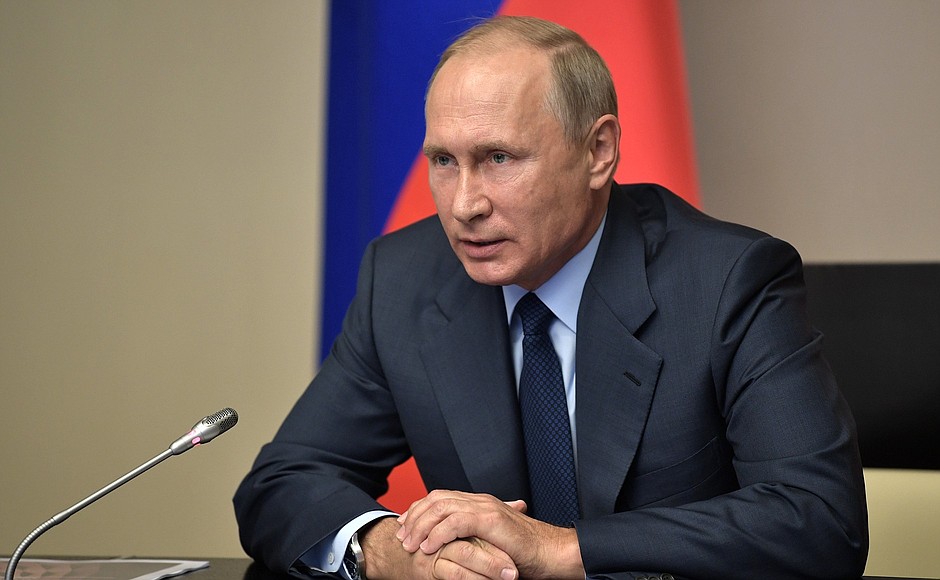
The President listened to a report
via videoconference on the destruction of Russia’s last
remaining chemical weapons.
Let me stress that the technology and all
the equipment that was used were developed by Russian researchers
and engineers. In addition, in accordance with your
instructions, in all municipalities where the facilities
for the elimination of chemical weapons were located, social
infrastructure facilities were renovated or built, with some 11.5 billion
rubles allocated. These funds went towards building more than 400 residential
buildings, 20 schools and kindergartens, 14 hospitals, 3 sports complexes,
more than 160 kilometres of roads, 640 kilometres of gas pipelines,
240 kilometres of water utilities, and many other social
and utility infrastructure facilities that will continue to serve
these municipalities and their residents.
As you have noted, in accordance with
international treaties Russia was to complete the elimination
of chemical weapons by 2020. However, in accordance with your
instruction that seeks, among other things, to ensure the safety
of the population in cities and districts where chemical
weapons were located, this work has been completed three years ahead
of schedule. The fact that today, on September 27, 2017
the last chemical ordnance was destroyed here in Kizner village
of the Republic of Udmurtia, was made possible
by the efforts of the Ministry of Industry
and Trade, the Defence Ministry, the Federal Security Service,
the Foreign Ministry, as well as the staff
of the Federal Directorate for Safe Storage and Disposal
of Chemical Weapons.
As you have already noted, out of more
than 70,000 tonnes of chemical weapons that existed across the world,
40,000 tonnes were located in the Russian Federation and 28,000
tonnes in the United States. However, the Russian Federation has
completed this work more than six years earlier than our US colleagues, despite
having a much larger stockpile.
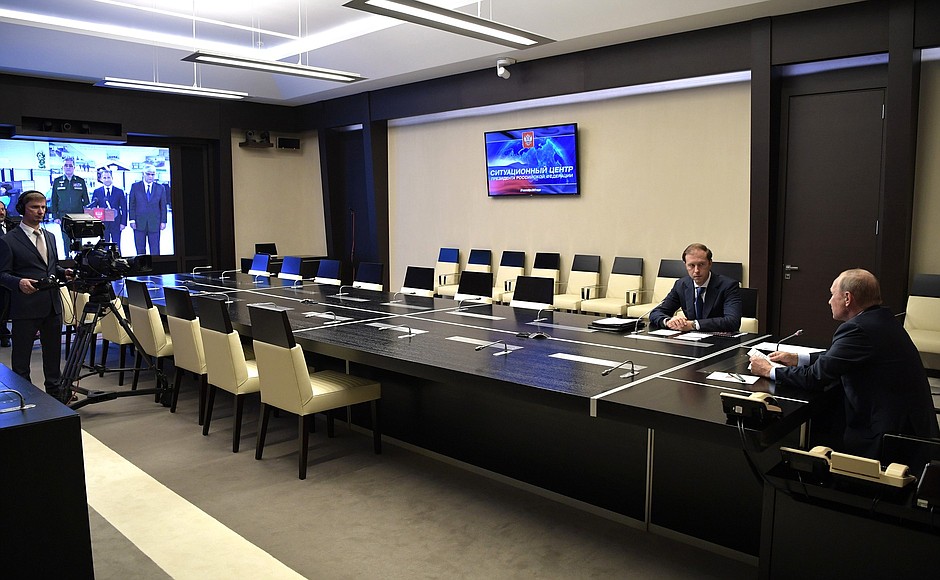
The President listened to a report
via videoconference on the destruction of Russia’s last
remaining chemical weapons.
Representatives of international organisations
and countries that are party to the Convention who are here
today express their gratitude to the Russian Federation and you
personally for completing this work so fast while observing
the strictest environmental requirements. This is a big contribution
to international security. It is important to note that during all
these years not a single accident took place at a single Russian
facility.
Mr President, the State Chemical Disarmament
Commission has completed all tasks set before it. All these years you
personally monitored the implementation of this most difficult task.
Starting today, the Russian Federation will be country that is completely
free of chemical weapons. To begin the process
of destroying the last chemical ordnance, allow me to turn
things over to Head of the Federal Administration
for the Safe Storage and Elimination of Chemical Weapons
Lt-Gen Valery Kapashin.
Vladimir Putin: Mr Kapashin, go ahead please.
Head of the Federal Administration
for the Safe Storage and Elimination of Chemical Weapons
Lt-Gen Valery Kapashin: Comrade Supreme Commander-in-Chief! We are ready
to eliminate the last ordnance bearing the toxic substance VX.
Requesting permission to initiate destruction.
Vladimir Putin: Permission granted.
Valery Kapashin: Initiate destruction.
What we are seeing is an ordnance after it was
drilled and placed in position to remove the chemical agent
where the ordnance is clasped. The device is checked to ensure
that it is hermetically sealed, it is rotated 180 degrees, the chemical
agent leaves the ordnance, then it is moved back into the initial
position and washed with a de-gassing solution after which it
undergoes thermal decontamination and deformation.
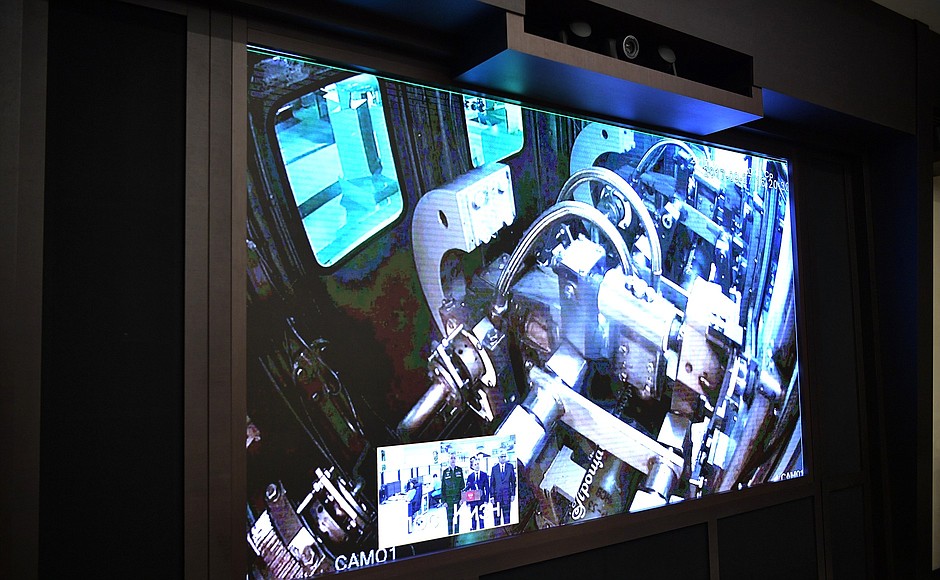
The President listened to a report
via videoconference on the destruction of Russia’s last
remaining chemical weapons.
Comrade Supreme Commander-in-Chief! Chemical weapons
in the Russian Federation have been fully destroyed.
That concludes my report.
Vladimir Putin: Thank you. Congratulations!
Mr Ali Rao, go ahead please.
Deputy Director General of the Technical
Secretariat of the Organisation for the Prohibition
of Chemical Weapons (OPCW) Hamid Ali Rao:
Mr President, it is a momentous occasion today
which signals the full elimination of all chemical weapons stockpiles
declared by the Russian Federation.
It is truly a historic milestone
for the Russian Federation, the OPCW
and the international community.
This joint success further contributes
to strengthening provisions of the Convention
and highlights its effectiveness in our journey together
to eliminate the chemical weapons and work together
for a chemical-weapon-free world.
It showcases Russia’s steadfast commitment
and contribution to disarmament and nonproliferation.
I sincerely appreciate your personal interest
and decisions to achieve this and offer warm congratulations
to you, Mr President, the Russian Government and all those who
worked tirelessly to make this remarkable success a reality.
Thank you, Mr President.
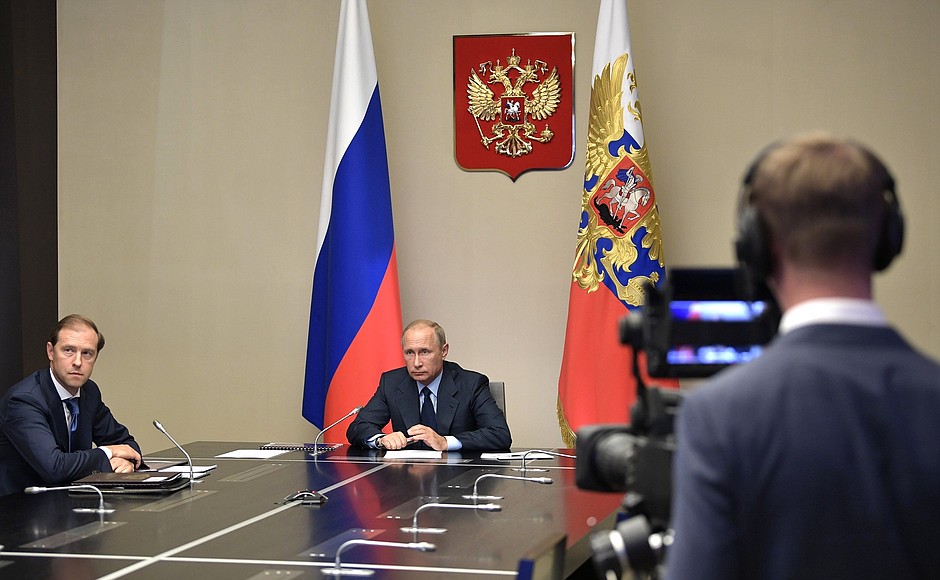
The President listened to a report
via videoconference on the destruction of Russia’s last
remaining chemical weapons.
Vladimir Putin: Mr Ali Rao,
In turn, I would like to thank you,
all your colleagues and the entire Organisation
for the Prohibition of Chemical Weapons for the joint
work conducted over many years to reach the goal that it took us
almost 20 years to accomplish. We worked together for 20 years
to move closer to today.
I would like to thank you again
and express hope that your organisation will continue working with
the international community to enhance confidence-building measures
and make the world safer, more stable and more secure. Many
thanks to you for cooperation.
And now I would like to ask our
Minister of Industry, Mr Manturov, to report on plans
for using the facilities, structures and infrastructure that has
been built, to address national economic tasks.
Minister of Industry and Trade Denis
Manturov: Thank you, Mr President.
Eight facilities were built
for the destruction of chemical weapons. This is cutting-edge
infrastructure. Almost 300 billion roubles were spent from the federal
budget for this purpose alone over these years. We would be interested
in using these facilities for commercial purposes. For instance,
we plan to organise the production of pharmaceuticals
and chemicals at the Pochep facility in the Bryansk
Region and the Maradykovsky facility in the Kirov Region.
We are planning to use the Kizner facility, where the last
chemical arms stockpile was destroyed today, to produce gunpowder
and explosives. We are ready to shut down the gunpowder plant
in the centre of Kazan and transfer gunpowder production
to a completely new site.
Mr President, I would like to stress that
at present Russia, in fact, does not have the necessary
capacities to neutralise industrial wastes of hazard class 1
and class 2 which total about 400,000 tonnes per year. To treat
the bulk of this amount, we are going to set up interregional
centres of hazardous waste decontamination, using such facilities as Kambarka
in Urdmurtia, Gorny in the Saratov Region, Shchushye
in the Kurgan Region and Leonidovka in the Penza
Region. To attract businesses, we intend to grant a concession
to operate those facilities, since the most interested parties are
companies, including those which use pension funds. Accordingly, under
the law, only a concession agreement is possible.
Some legislation has to be amended.
At the same time, in order to ensure that all
the seven facilities are handed over to investors now that
the chemical weapons have been destroyed, we have to completely
restore those enterprises to a healthy state. To do this, we
have earmarked 5.3 billion rubles in the 2018 budget.
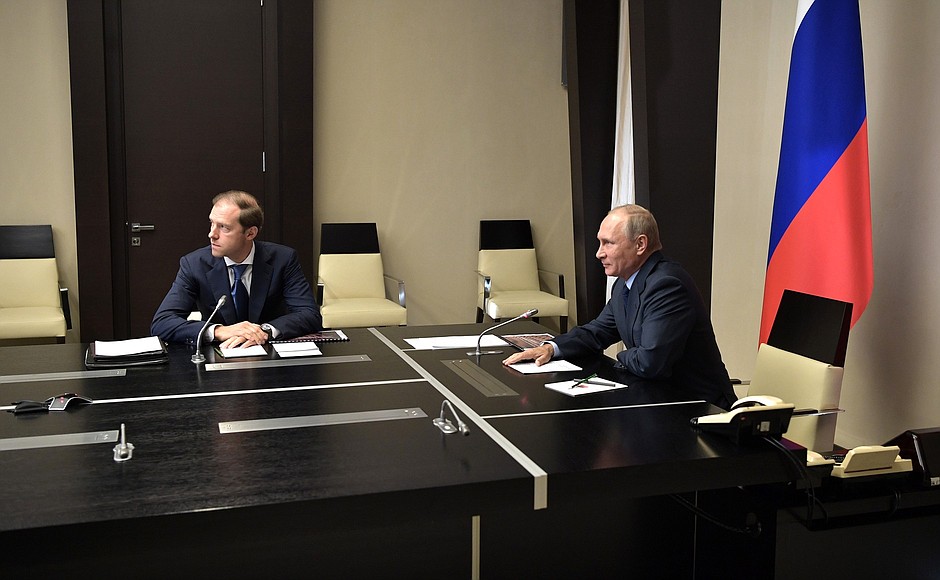
The President listened to a report
via videoconference on the destruction of Russia’s last
remaining chemical weapons. With Minister of Industry and Trade Denis
Manturov.
But taking into account the clean-up work that
follows the destruction of chemical weapons, we have prepared
a separate sub-programme for the period 2019–2024. With your
support, we will be able to submit it for consideration, submit it
to the Government and, jointly with the Finance Ministry, to reserve
funds for the period 2019–2024.
Vladimir Putin: All right. Have the final
details worked out and submit it to the Government.
Denis Manturov: Thank you.
Vladimir Putin: Colleagues, I am
addressing our colleagues in Kizner, let me thank you again
for the work you have done, and express hope that the plan
laid out by the Minister of Industry of the Russian
Federation will be implemented. All the infrastructure that has been
built, all the assets invested in the noble cause
of eliminating chemical weapons, will not be buried here, at these
enterprises; they will be used in the future for positive work
aimed at creating and developing. There are also enterprises
connected with the defence complex. By the way, gun powders are
used not only in the defence industry but also in civilian
industries, so all that should contribute to the development
of the respective regions. And the jobs created,
I hope, will not end up on the chopping block, we will do
everything possible to preserve them.
Thank you very much. All the best!







No comments:
Post a Comment